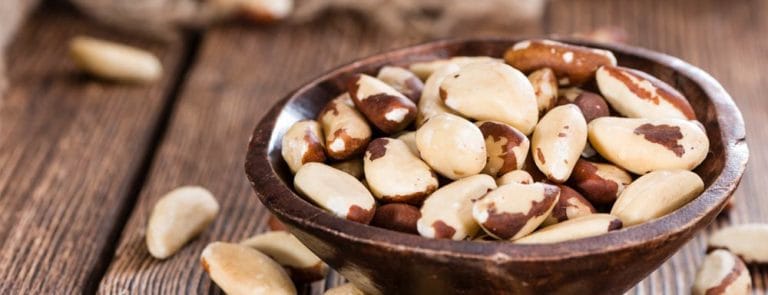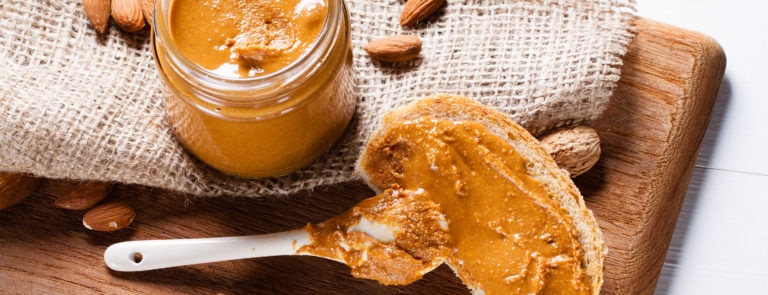10% off £35
A guide to selenium

Selenium is an essential mineral that we need in small amounts, which means we must get it through our diets. It helps support:1
- immune health
- thyroid gland
- sperm development
- hair and nails
- cell health
It’s found mainly in plant foods, with Brazil nuts being one of the richest sources, but also in meat and fish.
Functions of selenium: what does selenium do in the body?
Selenium is an antioxidant, which means it helps protect our cells and tissues from damage caused by an excess of free radicals, caused by smoking or pollution, for example.2
It is also important for our immune health.
A 2012 study by the University of Hawaii found that selenium helps:3
- kick-start the immune response
- regulate levels of inflammation
- prevent the immune response from going into overdrive
Healthy sperm
Selenium is also necessary for the development of healthy sperm, improving their number, concentration, shape and swimming speed, according to a 2016 USA study.4
In the body, selenium lives mainly in our muscles, but the thyroid gland has the highest concentration of selenium so it’s important to get enough selenium from your diet for a healthy thyroid function.5,6
Arthritis
Research by the University of North Carolina at Chapel Hill in 2005 discovered that people with the highest selenium levels in their bodies had a 40% lower risk of developing knee osteoarthritis compared with those with the lowest levels.7
Several studies have also found that people with rheumatoid arthritis (RA) have a selenium deficiency but more trials are needed to determine if taking selenium can help prevent RA.8,9
How much selenium do I need?
- 60mcg a day for women
- 75mcg a day for men10
This is roughly one Brazil nut, or four eggs.11,12
How much selenium do children need?
| Age | Amount of selenium a day |
|---|---|
| 1-3 years | 15mcg |
| 4-6 years | 20mcg |
| 7-10 years | 30mcg |
| 11-14 years | 45mcg |
| 15-18 years | 60mcg |
Selenium foods: which foods are the best sources of selenium?
Good sources of selenium include:
- Brazil nuts
- tuna
- sardines
- prawns
- turkey and chicken
Good vegetarian sources of selenium are:14
- Brazil nuts
- cottage cheese
- eggs
- baked beans
- oats
- spinach
Selenium deficiency: what are the symptoms of a selenium deficiency?
- infertility in both men and women
- fatigue
- weakened immune system
- muscle weakness
- depression and anxiety15,16
What happens if I consume too much selenium?
While selenium is essential for health, too much can cause selenium poisoning – a condition called selenosis.
The European Food Safety Authority says we should not take in more than 300mcg a day.17
Each Brazil nut contains around 70-90mcg of selenium; eating four nuts at once on a regular basis could mean you are eating too much selenium.18
Symptoms of excess selenium include:
- metallic taste in the mouth
- hair and nail loss
- nausea
- diarrhoea
- skin rashes
- fatigue19
Scientists have also reported an 11% increased risk of developing type 2 diabetes for people taking 200mcg a day of selenium supplements, according to a 2018 study in the European Journal of Epidemiology.20
Selenium supplements
When should I take selenium supplements?
If you eat nuts, fish or meat, you should get all the selenium you need from your diet.21
However, where you live can impact how much selenium you get from your food.
Selenium levels in the soil vary between countries, and are in decline – countries with already low levels include Scotland, Germany and Denmark.22
A selenium supplement might also be useful for people with thyroid eye disease, according to the British Thyroid Foundation charity.23
Should children take a selenium supplement?
No, they should be able to get all the selenium they need from a healthy, balanced diet.
Should women take a selenium supplement in pregnancy?
You should be able to get all the selenium you need from eating a balanced diet but if you live in Scotland, or another country with low levels of selenium in the soil, you could consider a supplement. It is safe to take in pregnancy.24
What are the benefits of taking a selenium supplement?
Scientists have discovered that selenium may also help support our brain health.
As selenium concentrations in the brain drop as we age, there’s a corresponding drop in memory and concentration, according to a 2012 review by the University of Alabama.
More studies are needed to fully investigate the link.25
Last updated: 2 September 2021
- http://ec.europa.eu/food/safety/labelling_nutrition/claims/register/public/?event=register.home
- https://www.ncbi.nlm.nih.gov/pmc/articles/PMC2698273/
- https://www.ncbi.nlm.nih.gov/pmc/articles/PMC3277928/
- https://www.ncbi.nlm.nih.gov/pmc/articles/PMC4854092/
- https://ods.od.nih.gov/factsheets/Selenium-HealthProfessional/
- https://www.ncbi.nlm.nih.gov/pmc/articles/PMC5307254/
- www.unc.edu/news/archives/nov05/jordan111005.htm
- www.ncbi.nlm.nih.gov/pubmed/9431590
- www.arthritisresearchuk.org/arthritis-information/
- https://assets.publishing.service.gov.uk/government/uploads/
- https://ods.od.nih.gov/factsheets/Selenium-Consumer/
- https://ods.od.nih.gov/factsheets/Selenium-HealthProfessional/
- https://assets.publishing.service.gov.uk/government/uploads/system/uploads/attachment_data/file/618167/government_dietary_recommendations.pdf
- https://ods.od.nih.gov/factsheets/Selenium-HealthProfessional/
- https://www.ncbi.nlm.nih.gov/books/NBK482260/
- https://www.healthline.com/health/selenium-deficiency
- http://www.efsa.europa.eu/sites/default/files/efsa_rep/blobserver_assets/ndatolerableuil.pdf
- https://ods.od.nih.gov/factsheets/Selenium-HealthProfessional/
- https://ods.od.nih.gov/factsheets/Selenium-HealthProfessional/
- https://www.ncbi.nlm.nih.gov/pubmed/29974401
- https://www.nhs.uk/conditions/vitamins-and-minerals/others/
- https://phys.org/news/2017-02-selenium-deficiency-climate.html
- http://www.btf-thyroid.org/professionals/research-news/193-selenium-supplements-and-thyroid
- https://efsa.onlinelibrary.wiley.com/doi/10.2903/j.efsa.2014.3846
- https://www.ncbi.nlm.nih.gov/pmc/articles/PMC3828033/














